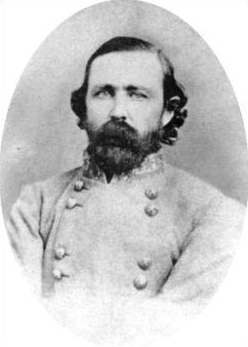George Earl Maney facts for kids
Quick facts for kids
George Earl Maney
|
|
|---|---|

Maney in uniform, ca. 1862
|
|
| Born | August 24, 1826 Franklin, Tennessee, U.S. |
| Died | February 9, 1901 (aged 74) Washington, D.C., U.S. |
| Buried |
Mount Olivet Cemetery,
Nashville, Tennessee, U.S. |
| Allegiance | |
| Service/ |
United States Volunteers |
| Years of service | 1846–1848 (USA) 1861–1865 (CSA) |
| Rank | Brigadier-General (CSA) |
| Unit | 3rd U.S. Dragoons |
| Commands held | 1st Tennessee Infantry Maney's Brigade Cheatham's Division |
| Battles/wars | Mexican-American War American Civil War |
| Other work | Railroad executive, political adviser, U.S. Minister to Colombia, U.S. Minister Resident/Consul General to Bolivia, U.S. Ambassador to Uruguay and Paraguay. |
George Earl Maney (born August 24, 1826, died February 9, 1901) was an important American figure. He was a soldier, a politician, and a leader in the railroad business. He also worked as a diplomat for the United States. Maney served as a general in the Confederate States Army during the American Civil War. After the war, he became an ambassador to several countries in South America.
Contents
Early Life and Education
George Earl Maney was born in Franklin, Tennessee. His father, Thomas Maney, was a well-known newspaper editor and judge. Young George went to the Nashville Seminary. He then graduated from the University of Nashville in 1845. He was 19 years old at the time.
Mexican-American War Service
Maney joined the military during the Mexican–American War (1846–1848). He started as a second lieutenant in the 1st Tennessee Volunteer Regiment. After his first term, he joined the United States Army. He became a first lieutenant in the 3rd U.S. Dragoons. This unit was part of General Winfield Scott's march to Mexico City.
Before the Civil War
After the war ended, Maney went back home. He studied law and became a lawyer in 1850. His law practice in Franklin became very successful. Maney then entered politics. He was elected to the Tennessee State Legislature.
American Civil War Role
When Tennessee left the United States, the American Civil War began. Maney joined a local militia group called the Rock City Guards. He then joined the Confederate States Army. He started as a captain in the 11th Tennessee Volunteer Infantry. On May 6, 1861, he was promoted to colonel of the 1st Tennessee. He served in western Virginia. He fought under General Robert E. Lee at the Battle of Cheat Mountain. Later, he served under General Thomas J. "Stonewall" Jackson.
Maney asked to be sent back to Tennessee. His home state was being threatened by Union forces. As an officer in the Army of Tennessee, Maney fought in the Battle of Shiloh. On April 16, 1862, he was promoted to brigadier general. He led his brigade in several major battles. These included the Perryville, Chickamauga, and Murfreesboro. In November 1863, he was badly wounded in his arm. This happened during the Chattanooga Campaign. He was on medical leave for much of that year.
In 1864, Maney commanded a division. This was part of William J. Hardee's corps during the Atlanta Campaign. He was captured in August but later released. However, he could not return to active duty. This was because of problems with his wounded arm. General Hardee suggested Maney be promoted to major general. But this promotion never happened. Maney surrendered after the Campaign of the Carolinas. He was released on May 1, 1865, in Greensboro, North Carolina.
After the War
After the war, Maney returned to Tennessee. In 1868, he became president of the Tennessee and Pacific Railroad. He held this important position for nine years. Unlike many other former Confederates, he became an active member of the Republican Party. He was elected to the state senate. During the carpetbagger era, Maney had a lot of influence. He worked with the Governor of Tennessee, Dewitt Clinton Senter. Maney helped bring back the state government to former Confederates. This happened once their civil rights were restored.
Maney also worked to improve relations between former enemies. This was during the time known as Reconstruction. In early 1876, he considered running for governor. However, he decided not to. In December of that year, his daughter Frances married a former Union officer.
During the presidencies of James A. Garfield, Chester Arthur, and Benjamin Harrison, Maney served as an ambassador. He represented the U.S. in various countries in South America. He was the U.S. minister to Colombia from 1881 to 1882. Then, he was the Minister Resident/Consul General to Bolivia from 1882 to 1883. He returned home and was a delegate to the Republican National Conventions in 1884 and 1888. From 1890 to 1894, he was the U.S. ambassador to Uruguay and Paraguay.
General George Maney died in Washington, D.C.. He passed away from a cerebral hemorrhage. He is buried in Mount Olivet Cemetery in Nashville, Tennessee.
Personal Life
In 1853, Maney married Elizabeth T. "Betty" Crutcher of Nashville. They had five children together.
 | Calvin Brent |
 | Walter T. Bailey |
 | Martha Cassell Thompson |
 | Alberta Jeannette Cassell |

